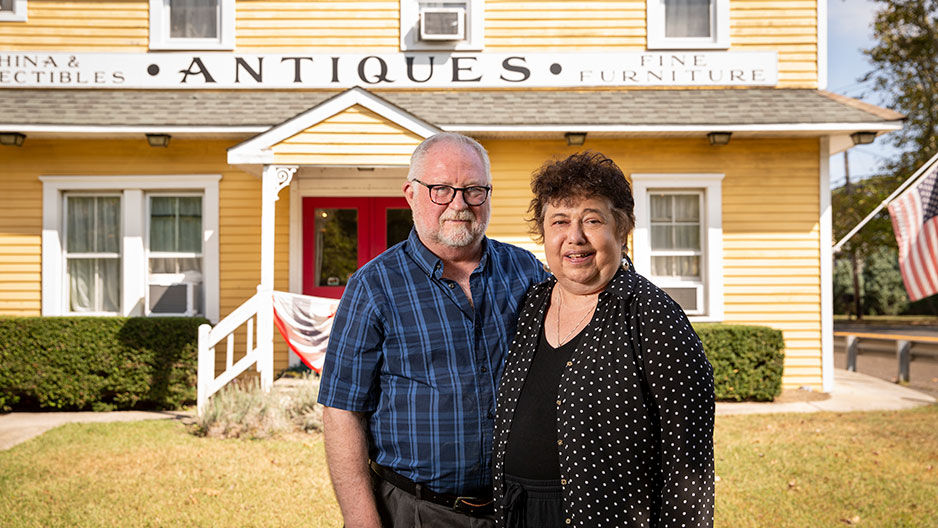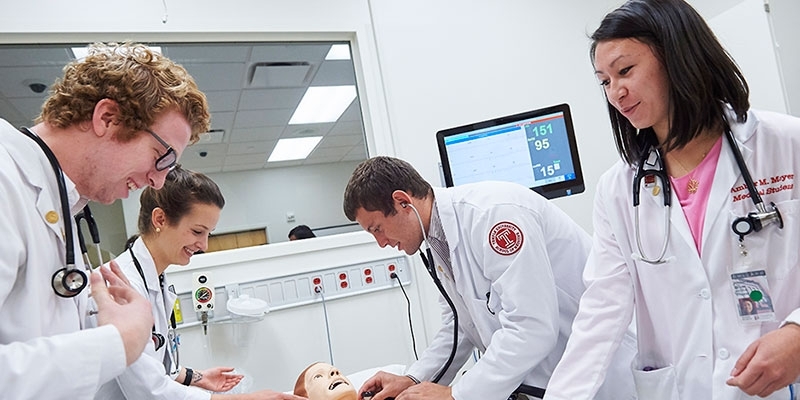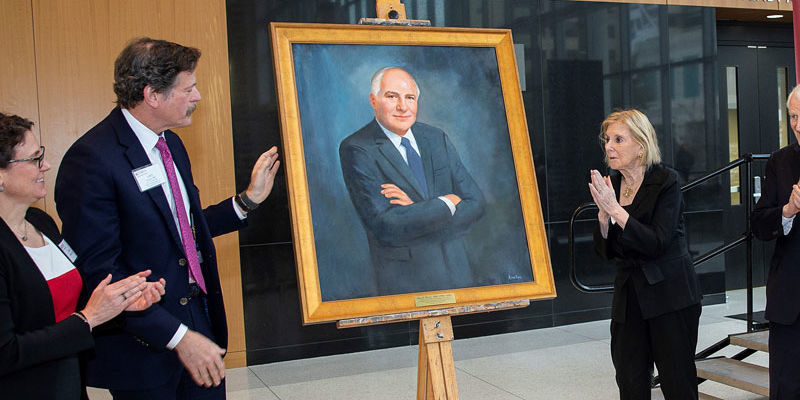Temple docs saved her life, so she’s thanking them with her legacy
Mary DeMaio was once told she was too high-risk for a kidney transplant—but Temple doctors agreed to perform the surgery and saved her life.

There was a time when Mary DeMaio and her husband, Wayne Stewart, didn’t think that she would survive.
Diagnosed with type 1 diabetes when she was just 18 months old, DeMaio spent her life outrunning the disease by meticulously managing her health.
But the disease finally took its toll, and her kidneys failed. By 2015, after nearly a decade on dialysis, DeMaio was desperately in need of a kidney transplant. But the first hospital she went to declined to perform the surgery, telling her she was too high-risk to take on and advising her to remain on dialysis.
“All I could think was I’d be dead if I stayed on dialysis,” DeMaio recalled recently as she sat in TreeHouse Antiques, the shop she and her husband have owned in Cape May, New Jersey since 2008. It was Stewart’s idea to purchase the shop to keep DeMaio—used to her busy career in legal work and publishing—occupied after she moved to Cape May.
“I was resolved that I was not going to make the year,” she said.
Then something miraculous happened: DeMaio sought a second opinion at Temple University Hospital, where she met Antonio DiCarlo, a transplant surgeon new to Temple at the time. It didn’t take much convincing for DiCarlo to agree to perform the surgery and have her added to the transplant list.
“That I was high-risk didn’t faze Dr. DiCarlo,” DeMaio said. “It was not an issue for him.”
Within about a year, they had a donor for DeMaio. And on May 5, 2016, DiCarlo and a team of doctors, nurses and support staff at Temple gave her a new lease on life.
“I have two birthdays now: May 5 and June 24,” DeMaio said, adding that the surgery not only saved her life, but also drastically improved it. She hasn’t needed dialysis since, leaving plenty of time for her and Stewart to enjoy selling antiques, a longtime passion of DeMaio’s. The pair opened the shop after DeMaio’s illness forced her in 2007 to leave her career as an in-house attorney and senior vice president of editorial for a New York-based publishing company.
DeMaio and Stewart thanked DiCarlo and the care team at Temple University Hospital and the Lewis Katz School of Medicine with the ultimate in paying it forward: a legacy gift of both their estates that will support abdominal organ transplantation at Temple for years to come.
The couple has designated that the funds go toward anything that DiCarlo—now chief of Abdominal Organ Transplant Surgery for the Lewis Katz School of Medicine and surgical director of Kidney, Pancreas, Liver and Living Donors at Temple University Hospital—sees fit, from education to research to patient outreach.
“Whatever he chooses to do, I know it will be the right thing,” said DeMaio. “He just changed our lives, and he changes other people’s lives, and I want him to be able to continue to do that.”
For his part, DiCarlo said, much of the credit should go to the collective effort that went into DeMaio’s care.
“I didn’t do it. There was an organ donor somewhere,” DiCarlo said as he sat in the lobby of Temple’s Katz School of Medicine Medical Education and Research Building. “I worked hard trying to plug in that kidney—this was not a standard operation by any means—but let’s not forget that we’re standing across from Temple University Hospital. Her care takes a village.”
DeMaio and Stewart said words can’t fully express their deep appreciation of that village. From the nurses to the other physicians who played a role in DeMaio’s care, to the pharmacy staff and the transplant coordinators, she said everyone they came into contact with at Temple made them feel cared for and confident.
“Everyone at Temple is so professional and so concerned about their patients,” DeMaio said. “I recently had back surgery at Temple, and I wouldn’t go anywhere else. I’ve been to hospitals here and in New York, and Temple is shoulders above.”
She doesn’t forget the other person who made this possible, either.
“This was a consummate gift,” DeMaio said of the donor kidney she received from a young man who passed away suddenly. “I can’t comprehend that during a time of grief, this man’s parents, relatives, friends decided to give his organs so other people could live. They’re in my thoughts and prayers every day.”
She and Stewart have become avid advocates of organ donation since her transplant and also plan to give to the National Kidney Foundation.
Beyond supporting organ transplantation at Temple, she and Stewart hope their gift will raise awareness around diseases that eventually require transplants.
“I don’t think most people know how needing a kidney devastates your life,” DeMaio said.
“Abdominal transplant gets less attention,” Stewart added. “But so many people are on dialysis.”
DiCarlo echoed the importance of transplantation and organ donation.
“You can never over-appreciate organ donors,” he said. “It’s the best way of staying alive when you have an organ disease. When we do a transplant, your life expectancy goes up, your quality of life goes up, and your ability to return to society as a productive, contributing member is there. You can go back to work. You can be there for your family. You can do meaningful, human things.”
He said DeMaio and Stewart’s gift to Temple will have a longstanding impact on not only abdominal transplantation itself at Temple, but also on the whole team of people who participated in her care and who care for patients day in and day out.
“It’s not just the money. It’s the fact that someone would think so much of Temple to do this,” DiCarlo said. “The fact that they appreciated what Temple did so much, it makes you feel motivated and proud of what you do.”
Learn more about the Transplant Program at Temple University Hospital and find out how you can support Temple’s mission.


